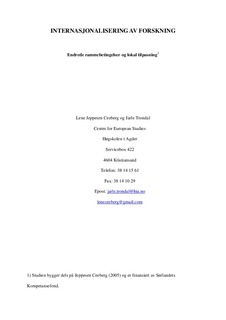Internasjonalisering av forskning : endrede rammebetingelser og lokal tilpasning
Working paper
Permanent lenke
http://hdl.handle.net/11250/134881Utgivelsesdato
2005Metadata
Vis full innførselSamlinger
- CES Working Papers [28]
Sammendrag
This article illustrates traditional and emerging patterns of internationalisation of research. The article identifies changing national and international conditions for research, and analyses the actual research practices among scientific personnel. The study covers the permanent scientific staff of four Norwegian universities, three poly-technical universities, and Agder University College. The empirical analysis builds on survey and interview data among permanent scientific staff as well as supplementary documentary materiel. Internationalisation of research is theoretically illuminated by two approaches – one organisation theory
perspective and one institutional approach. The empirical analysis unravels mismatches
between the research policies of Norway and the EU on the one hand and the research practices among the scientific staff on the other. Both the research policies of Norway and the EU build on an instrumental logic whereby internationalisation of research is a toolkit for innovation. International research practice among Norwegian scientists, however, reflects
primarily their demographic characteristics such as age, education and position, and to a lesser extent official research policies. Hence, international research practice among Norwegian scientists seems less sensitive to official research policies and university leadership, than to the demographic composition of the scientific staff.
